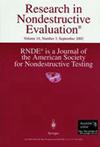Nonlinear Eddy Current Technique for Fatigue Detection and Classification in Martensitic Stainless-Steel Samples
IF 1
4区 材料科学
Q3 MATERIALS SCIENCE, CHARACTERIZATION & TESTING
引用次数: 1
Abstract
The increasing use of stainless steel in industrial structures can be attributed to its excellent mechanical properties at elevated temperatures. Martensitic grade stainless-steel is used, for example, to manufacture steam turbine blades in power plants. The failure of these turbine blades can result in equipment damage contributing to expensive plant failures and safety concerns. Degradation and structural failure of these blades is largely attributed to material fatigue, at the microstructure level. Hence, it is important to evaluate the level of fatigue prior to the initiation of macro defects to ensure the viability of these components. Conventional nondestructive evaluation (NDE) techniques such as ultrasonic testing and eddy current testing are suitable in detection of macro defects such as cracks, but not very effective in evaluating degradation of the material at a microstructure scale. This article investigates the feasibility of the nonlinear eddy current (NLEC) technique to detect fatigue in martensitic grade stainless-steel samples along with a methodology to classify the samples. K-medoids clustering algorithm and genetic algorithm are used to classify the samples according to the severity of fatigue. Initial results indicate that stainless-steel samples, in different stages of fatigue, can be classified into broad categories of low, mid, and high levels of fatigue.马氏体不锈钢疲劳检测与分类的非线性涡流技术
不锈钢在工业结构中越来越多的使用可归因于其在高温下优异的机械性能。例如,马氏体级不锈钢被用于制造发电厂的汽轮机叶片。这些涡轮叶片的故障可能导致设备损坏,造成昂贵的工厂故障和安全问题。在微观结构水平上,这些叶片的退化和结构失效主要归因于材料疲劳。因此,在宏观缺陷开始之前评估疲劳水平以确保这些组件的生存能力是很重要的。传统的无损检测技术,如超声检测和涡流检测,适用于裂纹等宏观缺陷的检测,但在微观结构尺度上评价材料的退化不是很有效。本文研究了非线性涡流(NLEC)技术检测马氏体级不锈钢试样疲劳的可行性,并给出了一种试样分类方法。采用K-medoids聚类算法和遗传算法根据疲劳程度对样本进行分类。初步结果表明,在不同的疲劳阶段,不锈钢试样可分为低、中、高疲劳水平三大类。
本文章由计算机程序翻译,如有差异,请以英文原文为准。
求助全文
约1分钟内获得全文
求助全文
来源期刊

Research in Nondestructive Evaluation
工程技术-材料科学:表征与测试
CiteScore
2.30
自引率
0.00%
发文量
14
审稿时长
>12 weeks
期刊介绍:
Research in Nondestructive Evaluation® is the archival research journal of the American Society for Nondestructive Testing, Inc. RNDE® contains the results of original research in all areas of nondestructive evaluation (NDE). The journal covers experimental and theoretical investigations dealing with the scientific and engineering bases of NDE, its measurement and methodology, and a wide range of applications to materials and structures that relate to the entire life cycle, from manufacture to use and retirement.
Illustrative topics include advances in the underlying science of acoustic, thermal, electrical, magnetic, optical and ionizing radiation techniques and their applications to NDE problems. These problems include the nondestructive characterization of a wide variety of material properties and their degradation in service, nonintrusive sensors for monitoring manufacturing and materials processes, new techniques and combinations of techniques for detecting and characterizing hidden discontinuities and distributed damage in materials, standardization concepts and quantitative approaches for advanced NDE techniques, and long-term continuous monitoring of structures and assemblies. Of particular interest is research which elucidates how to evaluate the effects of imperfect material condition, as quantified by nondestructive measurement, on the functional performance.
 求助内容:
求助内容: 应助结果提醒方式:
应助结果提醒方式:


